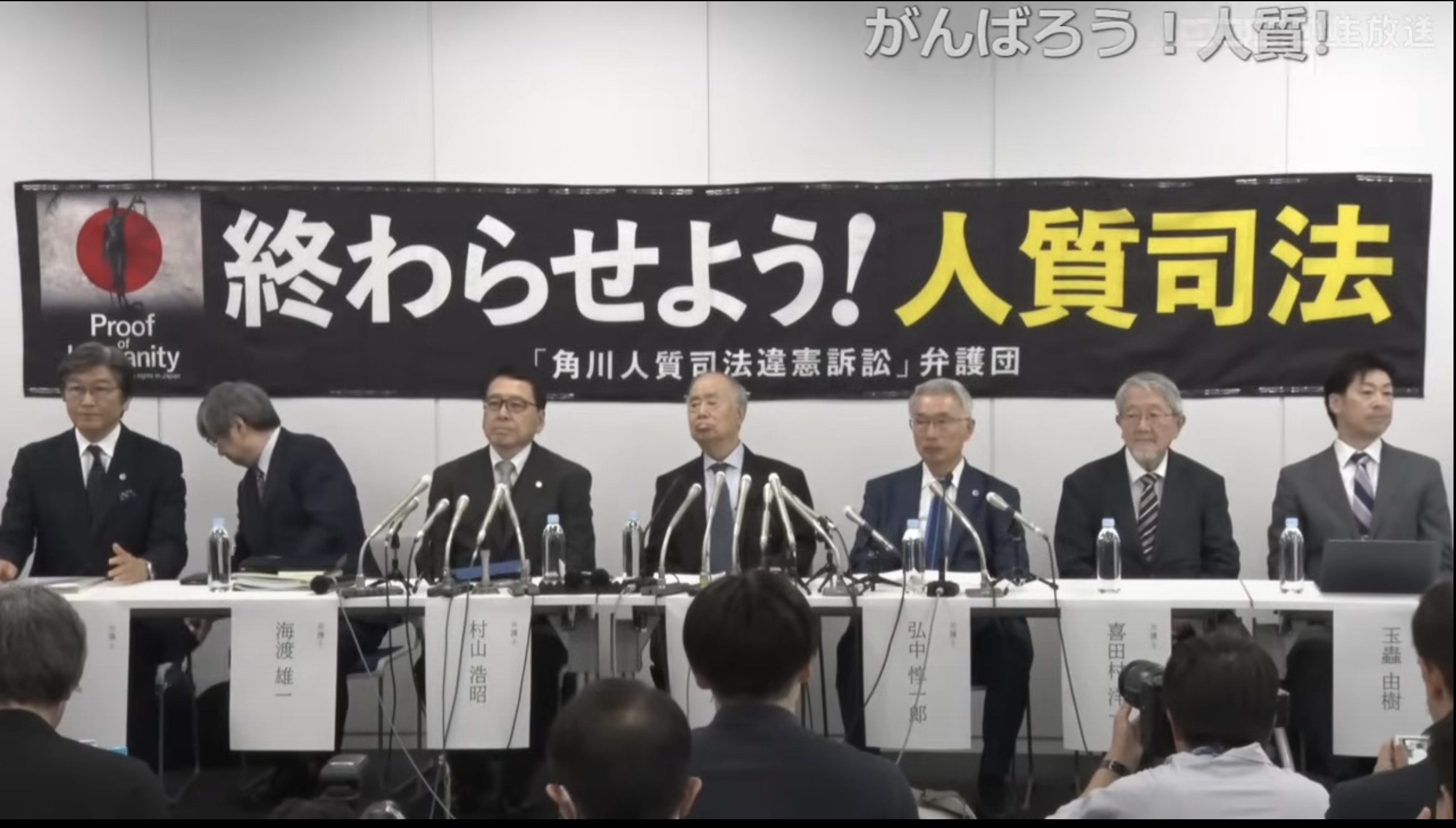Can the lawsuit filed by former KADOKAWA chairman Kadokawa Tsuguhiko move the country? Japan’s “hostage justice” system has drawn international criticism, but the Ministry of Justice, judiciary, and prosecutors are largely dismissive of these concerns.
The Ministry of Justice’s Stance: “Hostage Justice Does Not Exist”
It’s surprising that, even at this stage, the Ministry of Justice denies the existence of “hostage justice.” According to a criminal defense lawyer’s YouTube channel, the Ministry responded to an inquiry by stating that there is no such system in Japan. Here’s a video explaining the Ministry’s response to the lawyer’s question about hostage justice.
The Ministry’s Answer:
The term “hostage justice” refers to criticisms that our country’s criminal justice system detains suspects or defendants for long periods if they deny the charges, refusing bail to coerce confessions. However, Japan’s criminal justice system does not force confessions through detention. Such criticisms are not valid. In Japan, strict legal requirements and procedures govern the detention of suspects and defendants, with significant consideration for human rights. Detention is only permitted based on independent judicial review, considering the risk of evidence tampering or flight. Similarly, bail for indicted defendants is granted unless there are valid exceptions like risk of evidence tampering.
The Reality of Hostage Justice
This is completely off the mark. Lower-level investigative bodies leak information to the media, ensuring that trials are conducted with a predetermined outcome. The right to bail barely exists, and suspects are denied bail even when they do not tamper with evidence or pose a flight risk, regardless of their health.
The video also highlights that family members are held hostage. Japan’s inhumane “communication ban” rule prevents suspects and defendants from receiving any information from the outside world for extended periods, often without knowing the well-being of their families. This is not recognized as hostage-taking by the Ministry of Justice, but it is an egregious violation of human rights from an international perspective. Rational explanations are needed for claiming that the elderly Kadokawa Tsuguhiko poses a risk of evidence tampering or flight. Presumption of innocence is ignored, making the right to bail nonexistent.
Collusion Between Power and Media
The media should criticize such power, but due to geographic and systemic constraints in Japan, they often act as puppets of the authorities. They spread information received from the authorities, ensuring they don’t anger their sources. Japanese TV, newspapers, and radio often function as public relations for those in power, constantly pandering to them. Expecting fair and impartial reporting from these media outlets is futile. Like the case of Johnny Kitagawa, significant changes will only occur if overwhelming pressure from overseas media forces them to address these issues.
KADOKAWA’s Role in the Media
Kadokawa Tsuguhiko himself is a major figure in the publishing and media industry with KADOKAWA. The Tokyo Olympics scandal led to his arrest and indictment, raising awareness of the issue. It was somewhat positive that there was some reporting on the matter, even on mainstream TV.
Low Public Awareness
This issue must be considered separately from whether Kadokawa Tsuguhiko is guilty. Despite pointing out the process as hostage justice, the focus often shifts to whether Kadokawa himself is a bad person. If he is found guilty, the momentum for addressing this issue might dissipate. Many citizens lack the logical capacity to separate the proposer from the proposal, which is problematic.
However, many online media outlets are covering this extensively. Young people, who prioritize online sources over TV and newspapers, may gradually increase awareness of this issue.
Criticisms from European Friends
As previously mentioned, the concept of hostage justice is foreign to Europeans. Exposing suspects’ faces through media leaks, prolonged detention, communication bans, and forced confessions under physical and mental duress are actions criticized internationally. Yet, the current system remains unchanged. There is little hope for the media, which should have a high level of awareness, to drive change.
Conclusion
Although Kadokawa Tsuguhiko is quite elderly, he is fighting this battle, and I hope to support him in some way. For now, I will continue to write and publish my thoughts daily, sharing them with the world.
My goal is to write one article each day, refining my thoughts and improving my expression through practice.
角川歴彦氏の「人質司法」訴訟は国を動かせるか
出版大手KADOKAWAの角川歴彦(つぐひこ)前会長が起こした裁判でこの国を動かせるだろうか。日本の人質司法は国際的に問題になっているが、法務省を始め、司法や検察もこの指摘には後ろ向きだと言える。
法務省の見解は「人質司法は存在しない」
この後に及んで非常に驚くのであるが、刑事弁護士のYouTube企画で法務省に問い合わせたところ、我が国には人質司法などないとの回答を得られたという。以下、弁護士が人質司法について法務省に見解を求めて得られた回答がわかる動画です。
法務省の答え
「人質司法」との表現は、我が国の刑事司法制度について、被疑者・被告人が否認又は目標している限り、長期間勾留し、保釈を容易に認めないことにより、自白を迫るものとなっているなどと批判し、そのように称するものと理解しています。
しかし、日本の刑事制度は、身柄拘束によって自白を強要するものとはなっておらず、「人質司法」との批判は当たりません。
日本では、被疑者・被告人の身柄拘束について、法律上厳格な要件及び手続きが定められており、人権保障に十分配慮したものとなっています。
すなわち、日本の刑事訴訟法の下では、被疑者の勾留は、捜査機関から独立した裁判官による審査が求められており、具体的な犯罪の嫌疑を前提に、証拠隠滅や逃亡のおそれがある場合等に限って認められます。
起訴された被告人の勾留についても、これと同様であり、証拠隠滅のおそれがある場合などの除外事由に当たらない限り、裁判所(裁判官)によって保釈が許可される仕組みとなっています。
しかし、実際に存在する人質司法
全くお話になりません。
警察などの低級捜査機関によりメディアリークされ、結果ありきで裁判が行われる。
権利保釈など全く存在せず、証拠隠滅や逃亡のおそれを具体的に吟味せず、都合よく自白しない者はたとえ重篤な状態でも保釈を認めない。
また、動画でも彼らが指摘している内容だが、「家族」も人質にとる。なぜなら、日本独特の文化である「接見禁止」という非人道的ルールが存在する。ひたすら拘束して外界からの情報を被疑者・被告に一切与えず、家族の安否もわからないまま長期間拘束することを「人質」と認めないのが我が国の法務省であり、国際的な法感覚や人権感覚からしてもおかし過ぎる。高齢で有名な角川氏が証拠隠滅や逃亡の恐れがあるなどと言うのは合理的な説明が必要であるし、無罪推定の原理からもおかしい。有罪推定だから権利保釈なども存しない。
権力とマスコミの癒着
このような権力をマスコミも批判できれば良いのだが、地理的に閉鎖的なせいか、マスコミも権力の傀儡になっている。マスコミは権力側から情報を受け国民にばら撒いている以上、ネタ元を怒らせてはいけないのである。日本のTV・新聞・ラジオは権力側の広報という機能もあり、常に権力に忖度する立場となっている。公正公平な報道をこれらメディアに望むことを諦めるべきだ。ジャニー喜多川氏のように、いつか海外メディアに圧倒的に攻撃されるような事態にならなければ変化はこの癒着関係も変化は起こらないだろう。
KADOKAWAもマスメディアの一角を占めている
そんな角川氏もKADOKAWAという出版・メディアの一角を占める。東京オリンピックの疑獄があってはじめてKADOKAWAの元会長として、被疑者・被告を経験して問題提起が行われたのである。今回、角川氏が立ち上がったことにより、地上波でも多少の報道があったことはとても良かったと思う。
国民意識の低さ
この問題は実際に角川氏が有罪になるかどうかと切り離して考えなければならないのであるが、プロセス=人質司法と指摘しているのにも関わらず、角川氏が悪い奴なのかどうかに注目が集まってしまう。
角川氏が有罪となれば、この機運も一気に冷めてしまうかも知れない恐れがある。問題提起と提言者の処遇をわけて考えることが出来ない程の論理性しか持たない国民も少なくないので厄介である。
しかし、ネット系メディアでもとても多くの報道内容が上がっている。意識ある若者はTV・新聞よりオンライン優先なので、段々とこの機運が高まれば良いと思う。
海外(ヨーロッパ)の友人の指摘
前回記事でも書いたことがあるのだが、ヨーロッパ人の感覚でも人質司法は常識外れなようだ。マスコミリークにより顔を平気で晒し者にする(スケープゴート)、長期拘束、接見禁止、精神的・肉体的苦痛を与えるなど、シナリオ通りに強制してくる権力側の行為は国際的にも批判されているのにも関わらず、現状を維持しようとしている。今までの古く悪き体質を自ら変えることも出来ないし、意識が高いはずのメディアにも期待出来ない。
終わりに
角川氏も相当な高齢者であるが、命を賭けて裁判をしてくださるとのこと、僕も何かしらで加勢や応援が出来ないものかと考えているのだが、このように少しずつ考えを毎日書いて世界中に公開していくことをコツコツとやっていくのが僕なりの出来ることだと思っている。
一日一つ記事を上げて、考えを深め表現を最適化するトレーニングにしたいと思っている。



Comments